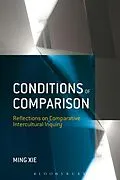How do we know the other culture? How do such inquiries impact on our knowledge of our own culture? These questions lie at the heart of comparative intercultural studies. As a theoretical inquiry into how conceptual resources of cultures (such as explicit and implicit categories of thought) may pre-figure our perspectives, this book re-conceives and reorients comparative intercultural inquiry by arguing for the importance of an epistemological approach and for its potential to transform current critical paradigms, in contrast to approaches that emphasize primarily the political and the ethical. By critically engaging with and developing the insights of scholars and thinkers from both Anglo-American and Continental traditions, the book makes a significant meta-critical contribution to a rethinking of comparative intercultural studies and literary theory. It will be of interest to students and scholars in comparative literature, English, world literature, and global and translation studies.
Autorentext
Inhalt
Acknowledgments
Introduction
Chapter 1: Multiple Definition
Chapter 2: From Comparison to Comparativity
Chapter 3: Hermeneutic Distanciation
Chapter 4: From Episteme to Paradigm and Back
Chapter 5: Splitting the Difference
Chapter 6: The Relativity of Relativisms
Chapter 7: Universalisms East and West
Chapter 8: Occidentalizing Modernity
Epilogue
Works Cited
Notes
